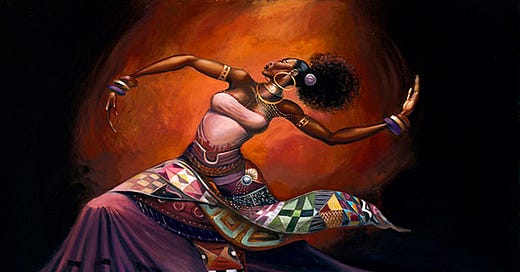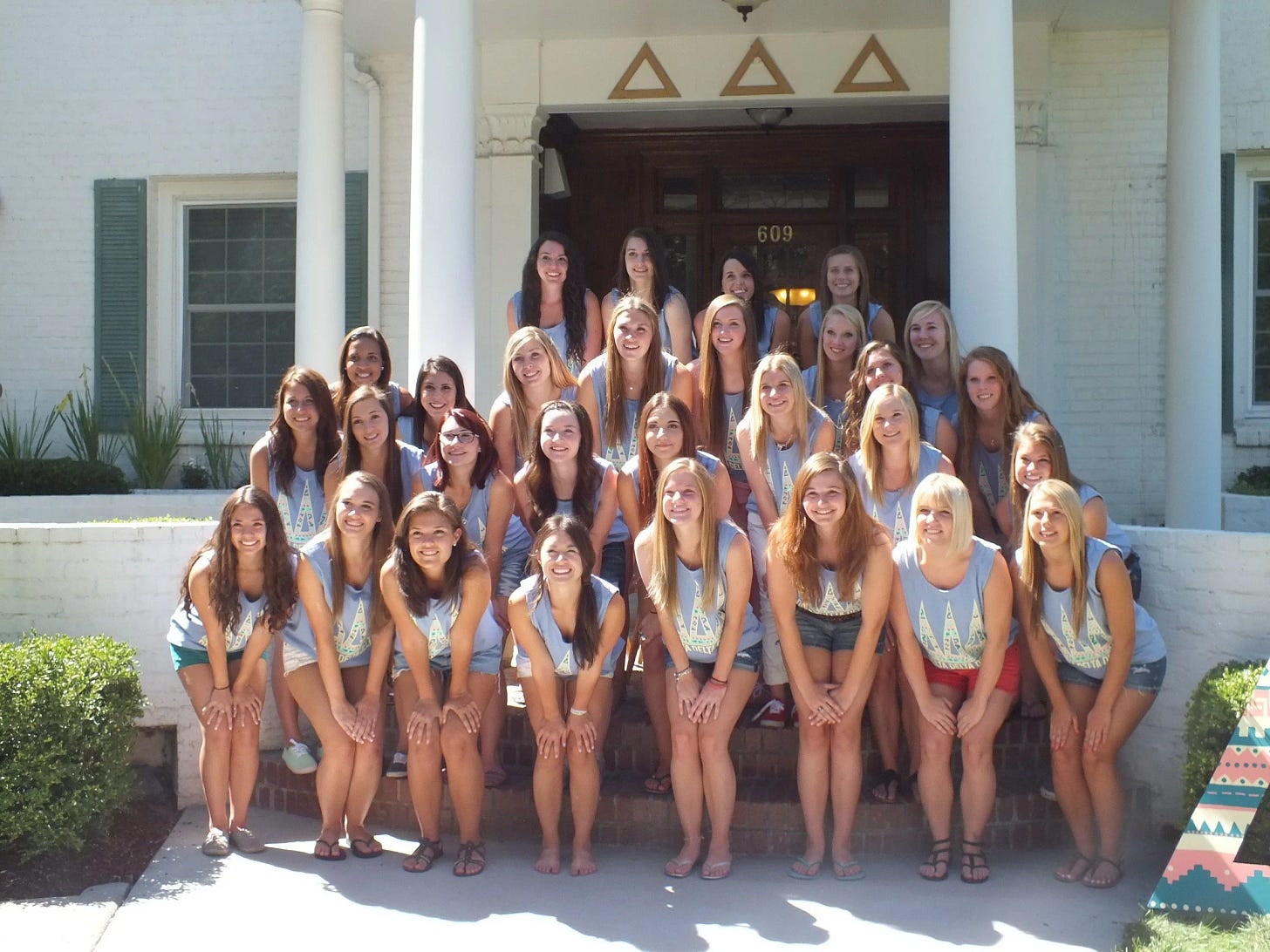'Womanhood' Was Never Ours Anyway
We never had the right to exclude trans women from ‘womanhood’.
(Art by Frank Morrison)
Fear arises through identification with form, whether it be (…) a social role, a physical body, a self-image”.
-Eckhart Tolle
I personally understood these words to mean that fear often arises from our desire to have ownership over (or ‘identification with’) things that are by nature ever-changing and ever-expansive; our social roles, physical bodies, self images... and whilst Tolle’s musings here were actually discussing object consciousness[1], I think this crucial part can be applied to our broader understandings of living, specifically with regards to our tendency to hold onto the identities we’ve acquired for dear life.
Being a woman
Womanhood is formerly understood as ‘the state or condition of being a woman’. You often hear people talk about when girls ‘come into’ their womanhood around the age of puberty, or you hear people discuss womanhood as a way of existing. Then there is the way in which womanhood is understood as a collective sense of comradery between women, found within the pure devotion found within female friendship groups, or between sisters.
Additionally, womanhood can be understood as a social role; in the way that identifying oneself with womanhood gives way to certain happenings in society. Whether these so-called happenings are voluntary or expected is a topic for another time perhaps, but there is a kind of role there. Previously when we still conformed to patriarchal understandings of ‘male’ and ‘female’ roles within society, women were so easily placed within the constraints of the expectations placed upon them, and so their social role was extremely clear, and womanhood was so easily identified with.
(Nothing to fear).
More recently though, as our understandings surrounding gender roles were destabilised, so was our restrictive understanding of what womanhood was, or what it meant to be a woman. All of a sudden how close you were to epitomising womanhood wasn’t relative to your ability to merely serve the men around you, and there had to be different ways to define womanhood. Of course narratives from science surrounding what defines womanhood had already been established; where women were defined by their cup sizes, periods, and reproductive capabilities. But even the scientific depictions of sex have also evolved far beyond that ‘understanding’ that only two sexes existed, or that womanhood could be reduced to a few simple qualities.
“Fear arises through identification with form, whether it be (…) a social role, a physical body, a self-image”….
After being left in the lurch, having had societal ideas of womanhood previously destabilised, and scientific depictions ever-expansive, it is no wonder that many have clung on so tightly to former depictions of womanhood, and feel threatened by the existence of those who identify with womanhood but don’t quite align with the way in which we’ve come to understand it. If womanhood can’t be defined by our social roles, or our physical bodies then it begs the question as to whether it can be so easily quantified. At the moment where it can’t, the choice is ours as to whether we allow the concept of ‘womanhood’ to be freely enjoyed by all who feel a connection to it, or whether we defend our previous definitions of womanhood, so that we may keep hold of the identities which serve to give us some semblance of security.
Black women as gatekeepers of womanhood
For those that had always been denied womanhood, our newly gained access to such an elusive sorority meant that when it came time to defend it, we were the pioneers of this cause. I find that within my own community, black cis-gendered women are some of the most viscerally transphobic for this very reason. From the ways in which we were consistently masculinised and therefore ostracised from womanhood a new sense of entitlement was born, whereby we must assert our place over those we have classed to be undeserving of womanhood.
One of the easiest ways to position yourself amongst exclusive groups is to simply exclude others from it. Truthfully, the habit that is black women aiming to oppress another group of women using a tool provided by colonialism never sat right with me. For as long as we can remember, we weren’t regarded as ‘real’ women either, and so as we aim to subjugate trans women and black trans women by extension we are also being utilised as an extension of white supremacy. We sit outside the sorority gates acting as guard-dogs of womanhood for those that sit comfortably inside the house never having to defend the thing they more suitably represent.
But I wonder when we’ll realise that for the vast majority of women, no matter our perceived superiority over others, womanhood was never ours anyway. I think that we can only really claim something as ours when we can say that we created that thing in the first place. Where people have utilised the ability to create art or build businesses from scratch we can envision a sense of ownership. But the concept of womanhood feels more to me like something we have all been given by others. The first depictions of womanhood under patriarchy were after all handed to us, and our willingness to adopt them now doesn’t make them any more ours. In the same way that race, currency, class, and time are all constructed, the concept of ‘womanhood’ is no exception. Being honest I’m not surprised at our feelings of insecurity when we’re shown to be threatened by those who define womanhood for themselves, if anything I’d have hoped that we managed to hide better our attempts at proving ourselves worthy by trying to deny others. Having been robbed of our personhood (our identity) so frequently, we tend to shamelessly cling onto anything that might provide us with a feeling of belonging.
Don’t get me wrong, most of the time it is easier to align oneself with societal constructs in order to understand how we are supposed to move through the world, and so there is a contextual need for these concepts at times. For example, the acknowledgement of race as a social construct doesn’t do away with the need to (at this point) categorise different racial groups, because different races are treated in accordance with their proximity to whiteness. Theoretically womanhood as a construct is functional in the same way, (except that it isn’t exactly).
What is it we’re after?
As earlier addressed, the designation of male and female roles is ever-changing within our society, and not even in the way that we’re seeing a linear progression from one set of expectations to another. If we look at gender expression, fashion for men and women operates more cyclically, where men in the 1300’s were seen to wear skirts, only for them to be seen as far to feminine in post-modern society, and more recently to be deemed as more acceptable again. What we’re seeing with gender expression is representative of the fact that the gender-associated constructs are uniquely fickle, and so when we find ourselves aiming to defend a sense of ‘womanhood’ we cannot know at any given time what it is we’re really defending.
“Fear arises through identification with form, whether it be (…) a social role, a physical body, a self-image”…
When we over-identify with any one idea that is socially constructed and therefore everchanging and ever-expansive we’re bound to go into crisis mode at any sign of change. Once we rid ourselves of this innate possessiveness then no one can tell us who we are, and we’re left with the job of defining what it means to be a woman on a more individual level, which is more liberating than anything else.
As far as our obsession with involving ourselves in the business of trans women, we have to at some point put the pitchforks down. Beyond their lives being non of our concern, we also cannot confiscate what was never ours to begin with. Our only jobs are to identify those places where the identities of others trigger us so easily, and find a way to somehow leave them, so that more of us might enjoy the comradery or pure devotion found in the purest demonstrations of womanhood.
Asisa.
[1] “On an understanding fairly common among philosophers, consciousness is the feature that makes states count as experiences in a certain sense: to be a conscious state is to be an experience.” https://plato.stanford.edu/entries/consciousness-intentionality/
“Object Consciousness leaves you feeling never satisfied, you never “arrive” and you often need others to feel inferior.” Marisa Cummings






